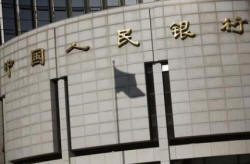|
 China
central bank to maintain 'prudent' monetary policy in
2015 China
central bank to maintain 'prudent' monetary policy in
2015
 Send a link to a friend
Send a link to a friend
[January 09, 2015]
BEIJING (Reuters) - The People's
Bank of China will continue to maintain "prudent" monetary policy in
2015, keeping credit growth stable while having its hands free to
fine-tune policy when necessary, the regulator said in an online
statement on Friday.
|
|
 However, the central bank said it would quicken the pace of
market-oriented interest rate reform and push forward on increasing
yuan convertibility in the capital account. However, the central bank said it would quicken the pace of
market-oriented interest rate reform and push forward on increasing
yuan convertibility in the capital account.
The People's Bank of China (PBOC) also said it would take steps to
prevent systemic risks in the financial sector, a sign that
regulators will maintain pressure on off-balance sheet lending and
shadow banking.
China has made a series of moves to clamp down on shadow banking in
recent months, including tighter regulations on the usage of bond
market and interbank assets for refinancing.
The announcement reiterates the PBOC's commitment to stable monetary
policy, even as speculation mounts that Beijing will have to take
steps to boost growth and fend off deflationary pressures, in
particular loosening monetary policy by cutting reserve requirement
ratios (RRR) for banks.

BAD EXPERIENCE FROM 2009
But many economists believe the PBOC has resisted such calls because
it fears that weak demand for loans from viable corporate borrowers
means fresh liquidity will only be funneled into speculative
ventures or help reinflate asset bubbles in property.
Analysts say the PBOC could take that view because of its experience
in 2009, when stimulus spending caused widespread economic
distortions.
A 50 basis point standard RRR cut would create an estimated 2.4
trillion yuan ($386.57 billion) in new funds after the money
multiplier is applied.
[to top of second column] |

Liu Ligang, China economist at ANZ in Hong Kong, has called for the
central bank to cut RRR or otherwise inject more cash into the
system.
He said that usually in an economy that's slowing firms do not see
the need for fast investment and "may not want to borrow more".
"But China's case is a bit different," Liu said. "If you look at the
last six years, firms have leveraged up quite a lot, previously bank
loans were at quite high interest rates. If China can relax monetary
policy further, firms could have a great incentive to borrow at a
lower rate, and use them to pay off high-yield debt. Merely doing so
will alleviate firms' financial burdens and also the risk of
default."
($1 = 6.2085 Chinese yuan renminbi)
(Reporting by Shao Xiaoyi and Jason Subler; Writing by Pete Sweeney;
Editing by Clarence Fernandez and Richard Borsuk)
[© 2014 Thomson Reuters. All rights
reserved.] Copyright 2014 Reuters. All rights reserved. This material may not be published,
broadcast, rewritten or redistributed.
 |